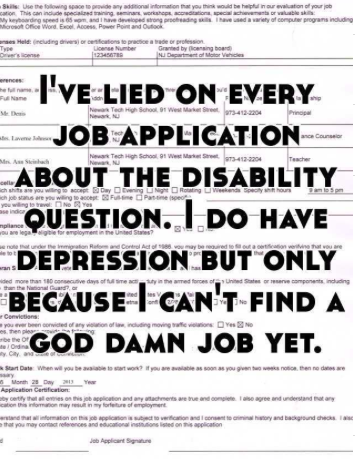It?s not about my work history or my skills.
It?s about that other thing that I?m not sure I want employers to know before they even meet me.
A decade ago, I got a job as a barista by circling an ad in the newspaper, then going into the coffee shop and dropping off my resume. That was the first and last time I ever got a job in that manner.
Since then, every job I?ve had has required interaction with an online form. You?ve probably had a similar experience; it?s just kind of how it?s done now.
Often, it?s a big, hulking, corporate beast that requires a login (that you?ll never remember) and a space for every job you?ve worked (which you?ll just copy and paste right off of your resume) and takes forever to fill out and you never hear back about the job, anyway.
Recruiting software has made applying for jobs an entirely different animal than it once was; it?s opaque and scary and all but demands a high volume of applications. This process also means HR managers are forced to sift through a high volume of applicants from all kinds of backgrounds ? and not just from millennials! The idea that millennials are doing most of the job-hopping is not substantiated by data.
No, it?s people of all backgrounds and ages and experience levels who, to ensure they get a call back ? just one! ? who are filling out three, six, fifteen of these a day. It?s the career equivalent of bees pollinating flowers; we just hope one will take hold.
The process makes people behave in ruthless and cunning ways. I even heard from a headhunter once that people are optimizing their resumes with all kinds of keywords and coded phrases to ensure that even if the resume itself looked like an absolute jumble to a person, it would read like a treasure trove of skills and accolades to Taleo or the Resumator.
Because you?ll do whatever you need to do to float to the top, right?
Of course.
Even if that means telling a lie?
Or at least, opting not to disclose the fact that you are a very qualified candidate who has also happens to have struggled with mental illness?
Of course.
 Image via Whisper. Interestingly, this Whisper received a comment which reads ?Depression is not a disability.? That?s not true.
Image via Whisper. Interestingly, this Whisper received a comment which reads ?Depression is not a disability.? That?s not true.
If you?ve ever applied for a job online, you probably recognize this area:

Ah, the diversity section.
If you have anything to possibly disclose ? and you know if you do; this is a very, very real and long-standing issue for candidates of color, mixed race individuals, trans individuals, and many others ? you might pause here. Maybe for a very long time.
And maybe especially if this section asks for more than just your race or gender (which are both fraught in their own right!), but also for your disability status.
Why is your potential new boss even asking about this stuff, you wonder? Will it hurt me, or possibly help me? And do I have to tell them?
Do I have to tell the person who may be considering hiring me that I?ve been diagnosed with a mental illness?
First, and let?s just get this out of the way, they?re asking about it because Equal Opportunity Employers collect this information to provide to the government to show that they are at least attempting to hire a less homogenous workforce (though it?s debatable whether or not, in many industries, that?s really panning out).
And to be perfectly clear, an employer cannot, under the law, decide not to hire a person because of the information in this section (thanks, ADA!); information about age, gender, race, religion, and a host of other factors (including gender identity; they?ve just begun tracking discrimination against LGBT individuals not that long ago) is collected solely for data purposes. Employers are legally prohibited from using this information against you. With most online staffing or recruiting sites, your potential hiring manager won?t even see these results.
Deep down, we all know this. Deep down, we also worry that the legalities don?t matter because human behavior is not always subject to the law.
Second, no, you do not need to tell anyone. You do not have to volunteer this information and it?s illegal to force you to do so. There should always be an option to not disclose, and not disclosing is not legally allowed to influence your application, either.
You probably know this, too. But still, there?s that feeling of secrecy. Because your invisible disability is just so much easier to ignore during this process. It might not, you think, even really count.
It does count, though. Some companies, just to make sure, will even explain it to you in case you don?t know it.
Buzzfeed, for example, explains it like this.
Because we do business with the government, we must reach out to, hire, and provide equal opportunity to qualified people with disabilities1. To help us measure how well we are doing, we are asking you to tell us if you have a disability or if you ever had a disability. Completing this form is voluntary, but we hope that you will choose to fill it out. If you are applying for a job, any answer you give will be kept private and will not be used against you in any way.
Buzzfeed also explains what, exactly, constitutes a disability.
Disabilities include, but are not limited to:
Blindness
Deafness
Cancer
Diabetes
Epilepsy
Autism
Cerebral palsy
HIV/AIDS
Schizophrenia
Muscular dystrophy
Bipolar disorder
Major depression
Multiple sclerosis (MS)
Missing limbs or partially missing limbs
Post-traumatic stress disorder (PTSD)
Obsessive compulsive disorder
Impairments requiring the use of a wheelchair
Intellectual disability (previously called mental retardation)
And here comes the lie.
But wait, you may think. I have been diagnosed with [OCD, bipolar, PTSD, chronic depression, you name it], but it doesn?t necessarily impede my work except for sometimes when it does, but usually I can just kind of muddle my way through.
Does that count? Is it real? Should I tell?
Visible disabilities ? i.e., those with physical attributes ? are what we commonly think of when considering disabilities as a measure of workplace diversity.
Like, when you see the word ?disability? on a job application or anywhere, you probably think of a person wheelchair. You might even think that that?s the only kind of disability, and that disabilities can be spotted and policed on sight.
?Do not try to imagine how you would perform a specific job if you had the applicant?s disability. He or she has mastered alternate ways of living and working.? ? Advice for employers from the Department of Labor.
But invisible disabilities (read about some very important work being done regarding invisible disabilities right here) are extremely common and, often, go under the radar and under-treated.
 Eughhhh this feels really hard to do.
Eughhhh this feels really hard to do.
About one in five American adults is estimated to live with mental illness of some sort. One in four, according to older numbers from the World Health Organization, are effected by either mental illness or neurological disorders at some point in their lives. Major depressive disorder is the leading cause of disability for Americans between the ages 15 to 44.3.
Think of five coworkers.
Or maybe, like me, you?re the one in five. And maybe, like me, you?ve never disclosed this on an application.
Not only have I never disclosed this about myself on a job application, I?ve often answered ?no.?
There is a great deal of talk about reducing the stigma around mental illness ? and not just from activists. People in startups are Tweeting about it. The President has talked about it. Rappers are taking part in it. There?s even this great clothing line that I read about recently that?s literally putting it on a shirt, and that?s really wonderful.
And part of that ? a really significant part of that ? is up to those of us have traditionally been silent to pipe up and say ?hey, me too! It looks like this, also.?
We talk about saying the words out loud, about telling people and making it clear that struggling and living with mental illness isn?t anything to be ashamed of.
But it?s one thing to tell a friend or even put it on social media; admitting to it on a form that is also directly related to your potential earning power is asking a lot more.
Individuals with disabilities have twice the rate of unemployment of those without, which means applying for jobs is even more difficult and even more crucial.
But if you can do the job well enough? If you?re qualified and you?d be a good fit and your mental illness is being treated or handled well enough (you think) to be a great candidate?
Even the professionals say you shouldn?t volunteer that information.
From a Monster.com blog post on the subject:
Dr. Daniel J. Ryan, author of The Job Search Handbook for People with Disabilities and director of career planning at the University at Buffalo, State University of New York, concurs. ?Employers use resumes to weed people out, so anything on the resume that would allude to a disability ? given the realities of the marketplace ? will probably work against you,? he explains.
Which means not only should you not disclose when checking the box, you shouldn?t include any information that might possibly hint at the fact that you have a disability.
That also includes gaps in employment. Social security covers diagnosed disabilities like chronic depression, because disability payment is more about how a disability impacts a person, rather than which diagnosis it stems from; for those who have been unable to work for more than a year, or who think they may be unable to work for a full year, it?s possible to receive disability pay in the United States.
Disclosing a disability could potentially allow an employer to make a reasonable accomodation. Or it could draw attention to periods where a person was collecting unemployment due to chronic mental illness.
And what about the millions of individuals who are able to function, able to work, never take time off, but still deeply hindered by their mental illness?
And what about all that data collection ? is it possible that all of our diversity numbers are skewed by virtue of the fact that we?re all lying on our applications?
Employers are required to provide reasonable accommodation to individuals with disabilities (if you?re unsure, or think that your boss is unsure, the Job Accommodation Network has guidelines for what constitutes ?reasonable? in most scenarios), but there?s still a squishiness to asking to, say, stay home from work because you have lost your will.
Depression is expensive for employers, and, even if you?re technically still performing your duties, if you live in an at-will state, you, as an employee, might not have a whole lot of recourse. And truthfully, a lot of employers just aren?t prepared to handle mental illness as a disability.
For many, many people, it still just looks like a weakness.
It?s much easier to just force your way through, to do everything in your power to exist as normally as possible, and to never tell a soul. You don?t tell anyone before you get the job, and you continue to not tell anyone once you?re in the job.
This is the result of the stigma surrounding mental illness and it?s the reason. It?s a cul-de-sac of shame and misinformation and it?s one that I perpetuate with every application.
Because there are some battles that I fight every day because and it?s much, much easier to fight them when I?m gainfully employed.

